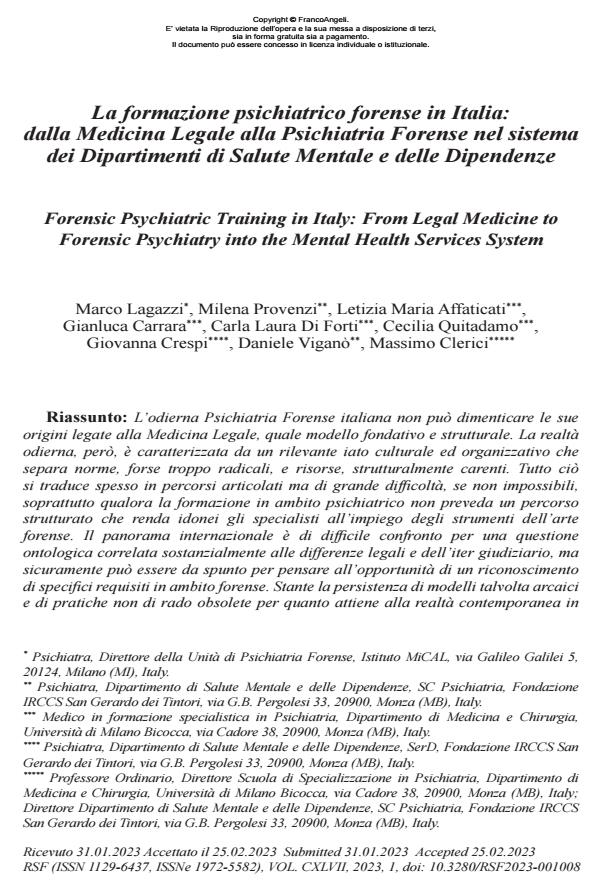Forensic Psychiatric Training in Italy: From Legal Medicine to Forensic Psychiatry into the Mental Health Services System
Journal title RIVISTA SPERIMENTALE DI FRENIATRIA
Author/s Marco Lagazzi, Milena Provenzi, Letizia Maria Affaticati, Gianluca Carrara, Carla Laura Di Forti, Cecilia Quitadamo, Giovanna Crespi, Daniele Viganò, Massimo Clerici
Publishing Year 2023 Issue 2023/1
Language Italian Pages 16 P. 125-140 File size 184 KB
DOI 10.3280/RSF2023-001008
DOI is like a bar code for intellectual property: to have more infomation
click here
Below, you can see the article first page
If you want to buy this article in PDF format, you can do it, following the instructions to buy download credits

FrancoAngeli is member of Publishers International Linking Association, Inc (PILA), a not-for-profit association which run the CrossRef service enabling links to and from online scholarly content.
The framework and the founding model of current Italian Forensic Psychiatry take stems from Legal Medicine. However, contemporary reality is characterized by a huge gap concerning the separation between the legislation and the resources: the former being somehow too radical, the latter suffering from a structural lack. Obviously, this leads to challenging paths which are impervious almost impossible, especially if the training course of a psychiatrist does not include a well-designed educational pathway enabling professionals to forensic art instruments knowledge. Regarding the international scenario, it is very hard to make a comparison with the Italian one, due to ontological issues concerning main differences into the legal system. On the other side, this kind of parallelism might be inspiring in order to start considering the opportunity of a specific forensic standards acknowledgement. However, there is still a persistence of archaic models and of outdated practices concerning current reality about the forensic topic. In the light of this, it is necessary to re-build educational models in order to propose a reform of evaluation parameters and of reference context to legislation. In the light of the foregoing, this latter aspect could further qualify the forensic job and consequently make it worth of being identified and recognized as part and parcel of Psychiatry: a cultural and educational renewal opening the horizons to a noble discipline.
Keywords: Legal Medicine; Forensic Psychiatry; Training; Acknowledgement.
Marco Lagazzi, Milena Provenzi, Letizia Maria Affaticati, Gianluca Carrara, Carla Laura Di Forti, Cecilia Quitadamo, Giovanna Crespi, Daniele Viganò, Massimo Clerici, La formazione psichiatrico forense in Italia: dalla Medicina Legale alla Psichiatria Forense nel sistema dei Dipartimenti di Salute Mentale e delle Dipendenze in "RIVISTA SPERIMENTALE DI FRENIATRIA" 1/2023, pp 125-140, DOI: 10.3280/RSF2023-001008